Peljesac Bridge Facing Coronavirus Related Issues Yet Again
July the 15th, 2020 - Peljesac bridge, a huge project of strategic importance to both Croatia and the European Union, hasn't remained immune to the troubles caused by the ongoing pandemic...
Coronavirus has done more damage to the global economy than anyone could have ever expected back at the very beginning of this year when pieces of information about a strange new virus began trickling out of the notoriously secretive China. Since then, the virus has taken the world and its economy by storm, seeing tourism grind to a halt and wreaking havoc with health systems across the globe.
Peljesac bridge, being constructed by a Chinese company, much to the dismay of the European Commission, has been experiencing numerous issues as a result of the difficulties caused by the spread of the new coronavirus.
As Poslovni Dnevnik writes, if welders from China don't manage to arrive at the construction site of the long-awaited Peljesac bridge soon, together with a new contingent of 47 steel blocks, the bridge will not be completed in about a year, when it should have been, Slobodna Dalmacija reports.
Due to the coronavirus crisis, the investor, Croatian roads (Hrvatske ceste) and the contractor, the Chinese state company China Road and Bridge Corporation (CRBC), left the possibility of extending the set deadline for completion (July the 31st, 2021) open for a few more months, but if the arrival of the steel blocks from Chinese steel ends up being prolonged, the opening of the bridge itself might only be able to occur at the beginning of 2022.
The Chinese have negotiated with the Croatian company "Brodosplit" to give them their welders, but so far, nothing has come of it.
Those more familiar with this issue claim that the Chinese eventually want to bring their welders over from China because they believe that their business reputation would be damaged if they introduced a company from Croatia to such an important business. This would of course mean that they'd be unable to build Peljesac bridge on their own, which, according to CRBC, would damage their business reputation.
The issue regards about five hundred Chinese welders. So far, seven of the twelve pillars and two abutments on the Neretva and Peljesac sides have been built.
For more on Peljesac bridge, follow our business section.
Sibenik Remains Festival Destination Even in Coronavirus Era
As Morski writes on the 14th of July, 2020, the second season of the festival programme is starting at the popular Martinska location near the historic Dalmatian city of Sibenik. At the location that came to life last summer in the very heart of beautiful Dalmatia, six festivals and events will still be held during July and August, despite the pandemic.
As such, Sibenik remains one of the few cities in Croatia and indeed across all of Europe where festivals are still being held.
The 2020 season opens with the 18th edition of the Seasplash Festival, which will take place from July the 16th to the 19th, followed by the ŠI Guitar Festival on July the 25th, the Slurp! festival which will be held for the first time outside Pula from July the 31st to August the 1st, the Membrain festival which is on the cards for August the 7th and the 8th, the Blast fest which will be held from the 14th to the 18th of August, and the programme closes with the Martinska Punk festival on August the 21st and 22nd. All of the festivals are held with the coordination of the production agency Positive Rhythm.
''We're glad that this year Martinska will be a place for the getting together of lovers of good music, as well as for people to come and enjoy the natural beauty with a view of the City of Sibenik. All of this is taking place in the specific conditions of the COVID-19 epidemic, but I believe the organisers have taken all of the necessary steps to ensure visitors have a safe stay on Martinska.
It should certainly be noted that the City of Sibenik has ensured the functioning of the Sibenik-Martinska circular ferry line, which received numerous positive reactions from our fellow residents and our guests last year, and I believe that this summer it will be a hit and contribute to a successful summer on Martinska,'' stated the Deputy Mayor of Sibenik, Pasko Rakic, at a press conference.
Individual programmes of all of the events that will take place during the summer on Martinska were presented at the end by representatives of all festivals, and you can view the entire programme here.
For more, follow our lifestyle page.
Croatian Institute of Public Health: Who Doesn't Need to Wear Mask?
July the 15th, 2020 - The measure which states we must wear masks when using public transport, when shopping and when indoors in public spaces is now fully in force. However, there are exceptions to this rule. The Croatian Institute of Public Health has detailed precisely who doesn't need to wear a mask.
As Poslovni Dnevnik writes, there are individuals who don't need to follow the rule of wearing a mask, and they are people who have specific health conditions and developmental characteristics that could be worsened by the covering of the mouth and nose with material.
The conditions cited are most often those in which wearing a mask can lead to difficulty breathing or danger of suffocation. In these conditions, it is necessary to set aside groups of people who don't need to wear a mask - they emphasised from the Croatian Institute of Public Health (HZJZ) regarding the "Decision on the necessary measure of the mandatory use of face masks or medical masks during the declaration of the COVID-19 epidemic."
They listed which people are not required to wear a face mask and situations where this is tolerated, such as cases where a person has trouble breathing due to a chronic illness or they're a person who suffers from a condition which makes them lose consciousness.
Those who don't need to wear a mask are listed below:
- Children up to two years of age
- Preschool-age children over the age of two if the child, despite the efforts of the parents/guardians to get them to wear a mask, resists wearing the mask or cannot refrain from touching the mask and their own face (some children are irritated by the mask and feel an intolerable need to adjust the mask and touch their faces, as such, the chances of getting the virus through the mouth, nose or eyes increase).
- Children over the age of two up to the lower grades of primary school need to wear a mask only when partaking in activities that are limited in time, and when they are under the constant supervision of their parents/guardians (for example when using public transport, in health care facilities or when going shopping, although parents are advised to take their children to the store only if absolutely necessary).
- People with certain forms of disability such as: certain mental health impairments including autism spectrum disorders if those individuals resist or can't tolerate a face mask, people with intellectual disabilities, and people with severe physical/motor impairments due to possible breathing difficulties or an inability to remove the mask without the help of another person.
- Persons who need to transmit information to a person who is deaf or hard of hearing, this includes interpreters for deafblind people and other accompanying persons, in a situation where the message cannot be written down or transmitted to such a person using sign language, but only by reading from the face and lips.
- People who are hard of hearing or deaf when in situations where a mask prevents effective communication and adequate understanding of the transmitted message.
- Persons with breathing difficulties due to them suffering from chronic diseases (these situations shouldn't be confused with a respiratory infections that are accompanied by a fever or other signs and symptoms that may be characteristic of the new coronavirus).
- Persons with altered consciousness or loss of consciousness, and those who suffer from conditions which cause either of these things to occur.
- All those who, for other reasons, cannot remove their own mask without the physical help of another person.
For more on the Croatian Institute of Public Health and coronavirus in Croatia, follow our dedicated section.
Croatia Confirms 52 New Coronavirus Cases, One Death
ZAGREB, July 14, 2020 - Over the past 24 hours 52 new coronavirus cases have been confirmed in Croatia, bringing the number of active cases up to 1,183, and one person has died, the national COVID-19 response team said on Tuesday.
Speaking at a press conference, Health Minister Vili Beros said Croatia had registered 3,827 cases since the novel coronavirus appeared 141 days ago.
The latest fatality was a man in Zagreb, born in 1951, who had many underlying conditions but was not on a ventilator. Since the start of the epidemic, 120 persons have died.
Five patients are on ventilators, one more than on Monday, and 129 patients are hospitalised.
Over the past 24 hours, 11 patients have been discharged from hospital and 33 have recovered at home. There are 81 active cases among medical staff, seven more than on Monday, and 508 are self-isolating.
To date 95,920 persons have been tested, including 1,745 over the past 24 hours, and 4.03% of the samples have been positive. Men account for 48.41%.
Education Minister and Ministry Officials Required to Self-Isolate
ZAGREB, July 14, 2020 - All the officials at the Ministry of Science and Education including Minister Blazenka Divjak were informed by epidemiologists on Tuesday that they had to self-isolate and take COVID tests after a ministry state-secretary had tested positive.
The ministry said in a press release that Minister Divjak had consulted epidemiologists and was instructed to go into self-isolation and to be urgently tested for the virus.
All of the ministry's officials were informed that they should self-isolate after the ministry's state-secretary proved positive, the press release said.
Unofficial sources have said that the state-secretary had attended a wedding party in Zadar, where some people have been identified to have caught the coronavirus. After returning to Zagreb she did not undergo a test or go into self-isolation and in the meantime attended a staff meeting of the ministry's officials and other meetings.
PCR Test, Croatian Border for Non-EU Arrivals: What We Know
July 14, 2020 - New border regulations for non-EU/EEA visitors to Croatia and a PCR test or self-isolation requirement are causing some confusion. Here is what we know about the current situation, including actual arrival experiences.
Croatia Travel Update: Answers to Recent FAQs, July 17, 2020
As previously reported on TCN, the sudden decision to require a negative PCR test or 14 days self-isolation on arrival to Croatia for all non-EU/EEA citizens, effective almost immediately. Announced on Friday evening, the new rules came into effect at midnight on Friday, meaning that many holidaymakers heading to airports for their Saturday flights found that they needed the PCR test or they faced 14-days self-isolation in one location in Croatia. Read more in Confusion Reigns After Sudden Croatian Border Requirement Change for Non-EU Citizens.
As the new rules came into effect on a weekend, it was harder than usual to find out the latest info, and the Total Croatia Travel INFO Viber community - which has been answering travel enquiries in these crazy times for almost two months (you will need to download the Viber app) was flooded with panicked questions from travellers already at - or on their way to - the airport.
Information is still coming together, and the situation is still very fluid. Here is what we know so far, starting with two testimonials from the TCTI Viber community - one from the United States with PCR test, and one from a UK citizen (still regarded as EU until December 31) arriving from a non-EU country, Ukraine.
Greetings from Split! Yes, I’m an American who successfully arrived into Croatia today. While the USA may be my homeland, Croatia is my heartland—so I am deeply relieved and still a bit stunned to finally be back. Here’s what happened:
Route was ORD-AMS-SPU on KLM. That airline deserves 11 stars for exceptional customer service on the ground and in the air!
At O’Hare, I had all my docs in order in a sunshine-bright yellow folder, secured with a yellow binder clip with a smiley face. Yes, adding some brightness to the airline agent’s day was part of my strategy to make this work! Our conversation went like this...Him: Do you have a Croatian passport? Me: No, I have a US passport, along with all the necessary documentation to show that I am legally allowed entry into Croatia. Him: Great! Let’s have a look. Me (flipping through each page): Here is the Enter Croatia Registration confirmation, negative PCR test result, and proof of 2 paid accommodations. That’s all I need to enter the country, but I have plenty more backup documentation if you’d like to see it. Him: Wow! You are very organized. Me: Yup. Him: Then you are all set to go! That literally took one minute—no checking/reading anything in detail.
The airport was wonderfully empty—no lines anywhere, and sanitization everywhere. The flight to AMS was one of the best I’ve ever had. After all the stress and last-minute scrambling, I decided to upgrade to Economy Comfort, and it was the best possible decision—an entire comfort row to myself, and very few people in that section at all.
The only thing I had to do at AMS airport—aside from walk from one gate to the next—was stop and enjoy an espresso. No transfer desk, nothing—just like any typical non-international layover.
The flight to Split was pretty full, but thankfully short. Border control did ask for the test result and checked to see that it was PCR and within the proper time frame. They did not care to see my accom receipts. It seemed obvious that there’s still plenty of confusion, as a lot of the agents were asking one another questions and helping one another clarify situations. That was that—and now I am sipping a lovely Plavac Mali and finally relaxing! Can’t even begin to express my gratitude to the moderators of this group for your diligence in keeping us all informed during these ever-changing times! Good luck to everyone else. Where there’s a will, there’s a way! (July 13)
The view from Kiev:
Departed to Pula this morning from Kyiv, Ukraine with Ukrainian airline Windrose. My husband who’s UK resident had to fight to get checked in without Covid test. Airline’s policy is everyone on board has to have a negative Covid test. Very stubborn. They brought a document from Pula airport where it days that EU residents regardless of the place of their living have a right to visit Croatia without a test. (July 14)
Here is what we have managed to ascertain so far:
The Croatian Border Police are insisting on the original test because there are lot of forgeries available on the black market - primarily from Serbia and Bosnia and Herzegovina. This is true for Croatia's eastern borders. Arrival by airports may be acceptable with email confirmation. We are still checking.
It is important that you have a negative PCR test not older than 48 hours - the rest are formalities. Anything more than 48 hours is not acceptable. The PCR is a must-have in Croatia because it is the only test detecting that you carry the virus - so Croatian health services INSIST ON PCR not older than 48 hours.
You can enter if your test is delayed and then you get mandatory self-isolation - you go to your location planned for self-isolation reported to the police and wait for test results. THE MISSING LINK is how and to whom you send your test and how you remove self-isolation. The Croatian Border Police are working on a solution. The big (and still not officially clarified) question is what happens if your test has not been processed by the date of your arrival? My understanding is that the police are working actively to make this process a lot smoother, as well as the procedure of this works in practice. IT IS JUST MY OPINION, but I would expect that if you arrive, you go into self-isolation, then once you get your negative result, you will be free to travel after approval from the Croatian police (while observing the appropriate social distancing protocols). This procedure is being worked on.
Currently, there is no testing facility on arrival option, but this is expected to change soon, and the police are actively working on a solution. I can give you some idea of how that will look, as yesterday, there was a dry run by MUP testing a system which is not publicly available yet but could soon be. This is how the first dry run is looking. If confirmed as policy, this could be the best option for many travellers.
This was the procedure, as recounted by the American visitor's partner who lives here in Croatia (PLEASE NOTE, THIS IS NOT AVAILABLE YET, BUT AN IDEA OF HOW THINGS COULD BE VERY SOON).
So he landed at 1 pm and he got to the border police and they wanted to know where he was staying, they asked if he understood the self-isolation (they said he can't leave the house) and said they will fine him if he breaks the rules.. then they asked if he was tested and he said he will get tested here. He gave them two addresses and that was okay he thinks, they didn't say anything about him having to stay in one place.. so then we went straight to the clinic at 2:30 pm for testing (address Mirogojska cesta 21), we went to the drive-in but they sent us to a building in the back of the clinic where we needed to fill out one form and they gave us 3 forms to take with us.. They asked if we want to pick the results personally or by email. We said by email. We had to go to the front desk at the clinic to pay, the price was 1506,08 kunas (about 200 euro). Then we went to the drive-in with the other two forms and receipt of the payment. We went to the apartment, no one checked on him and we already got the results at 8:30 am in the morning.
The test was negative, and so now we are waiting for the next steps from the police (we realise this is a very new approach), hope to be given the all-clear to travel to our home in Istria and start the countdown to our wedding.
So in short, he was allowed entry to self-isolate for 14 days, as per the new regulations, but with the possibility to take the PCR test on arrival, get the negative test the following morning, then proceed with the holiday as planned.
This article will be updated as more experiences come in, and as the official situation becomes clearer.
If you have any experience to share or have questions you need answering, join the Total Croatia Travel INFO Viber community (you will need to download the app)., or email This email address is being protected from spambots. You need JavaScript enabled to view it. Subject Borders
For the latest travel info, bookmark our main travel info article, which is updated daily.
Read the Croatian Travel Update in your language - now available in 24 languages
The Netherlands - as of July 21, Croatia is placed on the "Orange" list by the Dutch government, which means that both the Croatian nationals and the Dutch nationals returning to the Netherlands from Croatia are strongly advised to self-quarantine for 14 days.
Minister Bozinovic Talks Possible Penalties for Not Adhering to Measures
As Poslovni Dnevnik writes on the 13th of July, 2020, Minister Bozinovic, the head of the National Civil Protection Directorate, explained how whether people are wearing protective masks indoors, which is mandatory in stores from today onward, will be monitored and controlled.
Minister Bozinovic said that we are facing a new dynamic of the spread of the new coronavirus on a global level. Here in Croatia, as he said, local measures will be applied and local hotspots will be extinguished, but there will also be measures that will be applied at the national level, such as the introduction of wearing masks in restaurants, shops and when using public transport.
"In autumn, we could face more proliferation and more severe symptoms, so now we need to acquire the habits we will need for when autumn comes," he said, noting that this is why they have resumed press conferences, which also serve as a means of educating the general public.
"Our basic approach is to inform the public. There's not much point in issuing penalties, but we'll also have certain sanctions if a measure is not accepted. Hopefully that won’t happen. Large centres have security guards where it is not a problem to just refuse entry to a person who isn't wearing a mask, in small shops, the staff aren't allowed to serve someone if they aren't wearing a mask. There aren't so many police or inspections that they can control everything… We'd like to appeal to everyone to call 112 or the police if there needs to be an intervention,'' he said.
He stated again clearly that if faced with issues, shop employees and those working for hospitality facilities are free to call the police (112) to come and deal with difficult people.
Minister Bozinovic also stated that everyone's goal is to accept the ''new normal'' for what it is at the moment and that wearing masks indoors should simply become a practice. "They've been shown to be effective," he added. From day to day, he said, they will repeat everything they consider important to prevent the spread of the new coronavirus. He added that they're continuing to make sure that the tourist season is as good and safe as possible under these unprecedented circumstances.
For more on coronavirus in Croatia, follow our dedicated section.
Cheaper COVID Testing Announced
ZAGREB, July 13, 2020 - Health Minister Vili Beros on Monday announced a lower cost of COVID-19 testing for people who wish to be tested on their own accord, adding that tests like PCR have a price because they provide quality while other tests are being developed for the general population.
Tests are free of charge when they are taken by suspected cases at the recommendation of professional medical staff due to medical indications.
"It is understandable that someone may wish to be tested for personal reasons, for example, to be certain and safe for their household. We will make that possible soon at many different prices than they were initially," Beros told a press conference, adding that more information in that regard could be expected by Wednesday or Thursday.
Forming prices involves the use of chemicals, reagents, human effort, and everything that is needed for test-taking.
Bozinovic: If a measure does not adhere to penalties will be applied
Asked how it will be possible to control whether masks are being worn, the head of the country's COVID response team, Davor Bozinovic said that some measures will be applied locally while others will apply to the entire country.
"We are taking into account that autumn could be when we are faced with greater challenges considering the spread of the coronavirus and perhaps even harsher symptoms. That is why we need to utilize this period to acquire habits that will be essential when the autumn comes," he said adding that these press conferences were aimed at educating the public.
"The basic approach is to inform the public. Penalties are not the point so much however we will have them and apply certain penalties if measures are not adopted but we hope it won't come to that," he added.
53 new COVID-19 cases in Croatia
In the past 24 hours, 53 new cases of the coronavirus have been confirmed in Croatia and currently, there are 1,145 active cases in the country without any new deaths, the National Civil Protection Authority informed on Monday.
There are currently 1,145 active cases, while 1,620 have fully recovered to date.
53 New COVID-19 Cases in Croatia
ZAGREB, July 13, 2020 - In the past 24 hours, 53 new cases of the coronavirus have been confirmed in Croatia and currently there are 1,145 active cases in the country without any new deaths, the National Civil Protection Authority informed on Monday.
Today it is 140 days since the first confirmed case of the coronavirus infection in Croatia and in the past 24 hours we identified 53 newly diagnosed cases, which brings the total number of positive cases to 3,775 since the outbreak of the epidemic, Health Minister Vili Beros told a press conference.
The average age of patients is 47.4 years. No one has died since yesterday and four patients are on ventilators while 132 are hospitalised.
There are currently 1,145 active cases, while 1,620 have fully recovered to date..
A total of 94,175 people have been tested for the virus.
Beros informed that technical glitches had appeared in recording new positive cases of the disease in Istria County. Today it is clear that that number is zero however Beros has called for a written explanation for Sunday's figures.
"It is clear and visible that we are continuing to live with the virus. It is still among us and we have to be cautious," said Beros.
Croatia's death toll to the virus stands at 119.
Can Good Communication Save The Season? Boškinac on Pag Busier Than In 2019
July 13, 2020 - Marc Rowlands interviews Boris Šuljić, owner of Boškinac on Pag, a Michelin-starred restaurant, to try and discover the secret to success in the challenging summer of 2020
Among the neverending doom and gloom of this year, a ray of sunshine through the clouds. At Boškinac on Pag, the restaurant, hotel and winery, business is booming. With better numbers than at this point in 2019, is it possible the luxury sector is suffering less this season from COVID-19? And what is the secret to Boškinac's success so far in 2020?
“I am very satisfied with this year's business,” Boškinac owner Boris Šuljić told TCN with a smile and a carefree tone to his voice. “It's definitely busier than last year. Some days are better than others but, generally, more people are coming.”
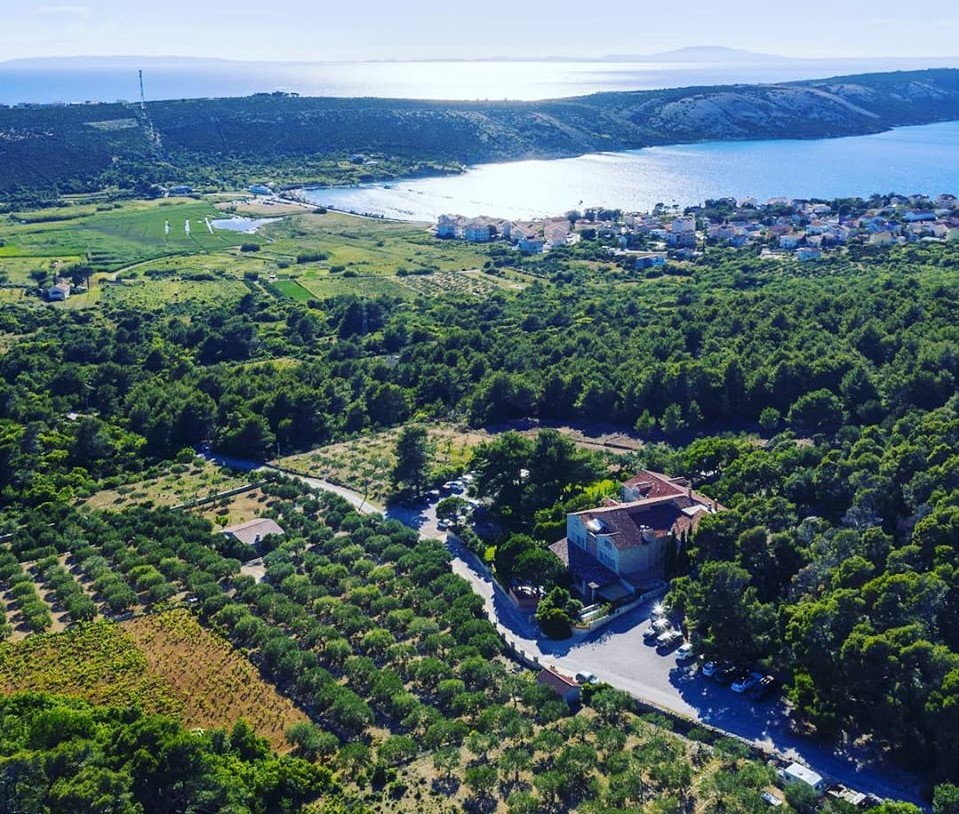
An island within an island. Pag's Boškinac is located within a lush green and neighbourless section of the island's interior © Boškinac
In a year where, depending on who you believe and how you extrapolate the info, tourism in Croatia is down by at least 50%, people sit comfortably isolated on Boškinac's large terrace. There, they take in the view of the olive trees and Boškinac's vineyards, with not a neighbour in sight. With special measures in place, seats in their Michelin-starred fine dining restaurant are similarly full. But just where are these guests coming from?
“Most of them this year have been from Croatia and Slovenia,” says Šuljić, not unsurprised. “I'd say the next largest group is foreign nationals, ex-pats, who now live in Croatia. But, also we've had quite a few from Germany, Austria, and Belgium. It's not so difficult for us to get busy. We are a relatively small hotel - 11 rooms, 55 seats in the fine dining restaurant, and 40 seats in our more informal tavern.”
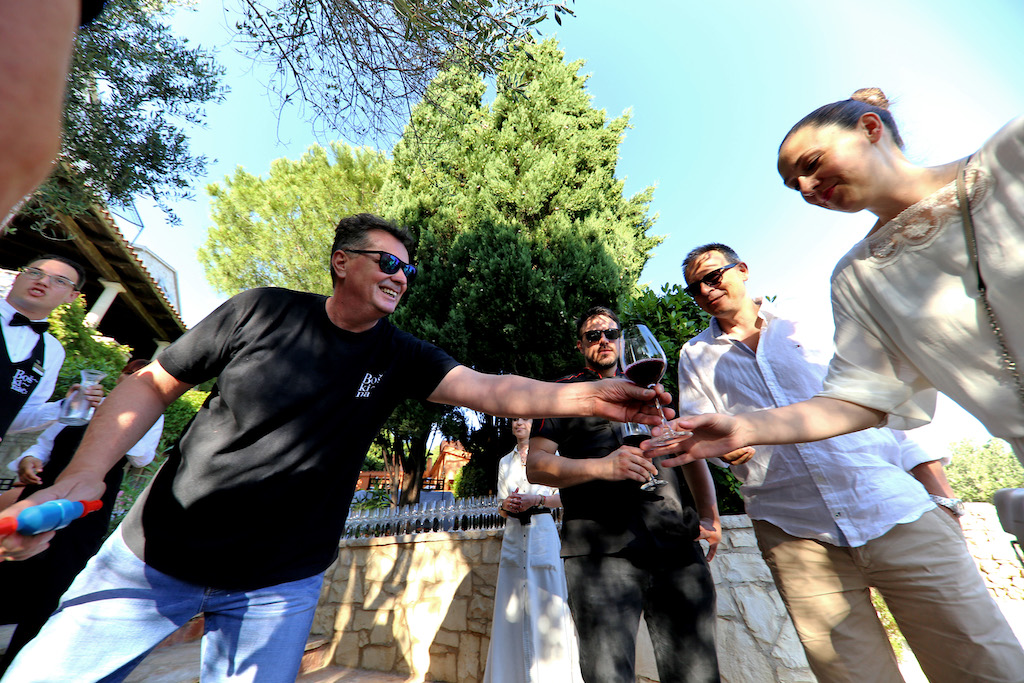
Boris Šuljić welcoming guests to Boškinac with a glass of their own-made wine in summer 2019 © Fabio Šimićev
Šuljić estimates that in total around 60% of 2020's guests have come from Croatia, 40% from other countries, a distinct change in the usual demographic they receive. Awarded a Michelin star in February of 2020, the hotel and restaurant have earned a reputation internationally for high-quality food, wines, service, and an experience much more unhurried and relaxing than that found in many places on the popular island. So, has he dropped his prices to encourage this year's draw?
“No, not at all” Šuljić tells us, “our prices remained normal. We are not so expensive like some other 4 or 5-star hotels in Dubrovnik, Rovinj, or Split. The average room price is around €200. Until 15 July, we arranged some special packages with the room and fine dining. We kept the food at the same price but offered the rooms a little cheaper in combination. It was successful. It seemed to attract people who'd heard of the hotel and restaurant, who maybe decided that right now was the best time to come and look. It's not so far to come here to check us out when you only have to travel from Split or Istria, even Zagreb, which is where many of these guests have been coming from. They stayed for one or two nights and enjoyed our Michelin-starred restaurant.”
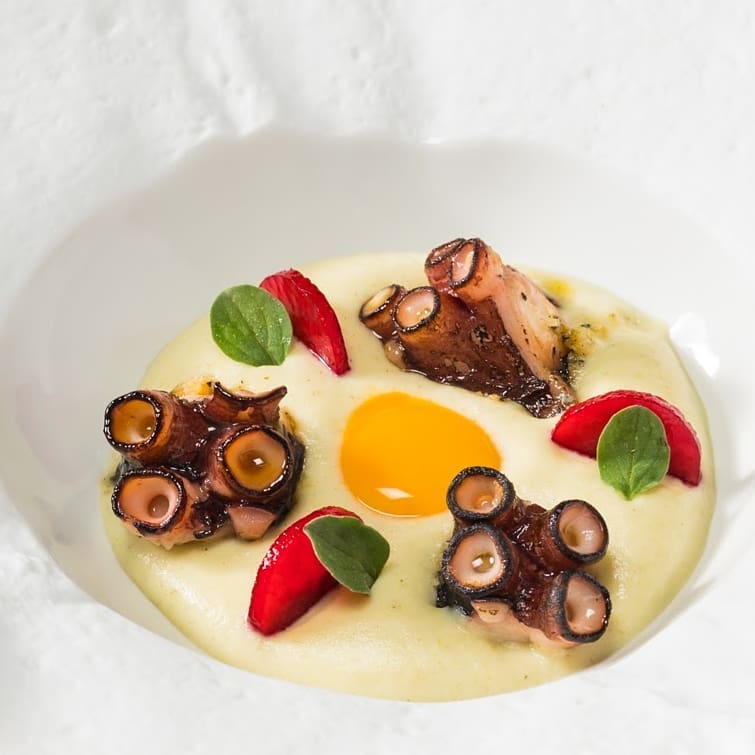
The flair with which Boškinac on Pag use their fresh, locally-sourced and premium ingredients earned them a Michelin star earlier in 2020 © Boškinac
Always keeping on top of developments in Croatia's gastro scene (you can stay updated on our Gourmet pages), one of TCN's most recent reports from Boškinac noted the venue's fluctuating success of the 2019 season. The summer's unusually variable weather was considered as perhaps one factor in the lack of footfall. With the sun shining reliably on Pag this summer, could it be that visitors care more about the weather than they do about Coronavirus? Is sun-seeking really a greater deciding factor for those looking at Croatia holidays than the ever-updating COVID-19 situation? Šuljić thinks not.
“I definitely think we're busier this year because of the Michelin star,” he says. “People seem to really recognise this international sign of quality. We got a lot of attention because of this. I think it is also because of our communication. We capitalised on the attention and we have been sending out very positive messages. We have every reason to be optimistic and it is this optimistic message we have been sending out; we are here, we are a small place, isolated, we have no neighbours, with allocations for relatively few people, but with lots of room and air and enough terrace for everyone. This is not the usual kind of busy hotel that's packed with people. We are very passionate about our food and our hotel experience. Ours is a business that concentrates on quality, not quantity.”
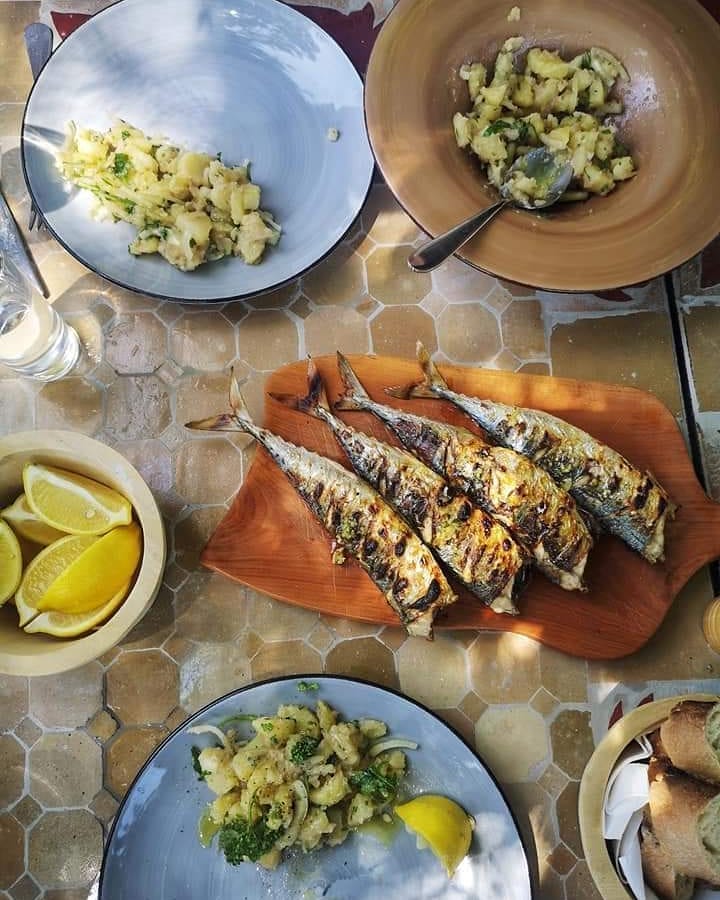
A platter of distinctly Dalmatian delights, an example of the food on offer at Boškinac on Pag's less-formal tavern restaurant © Boškinac on Pag
Though Šuljić's international recognition, unique premises and isolated location undoubtedly offer an advantage in attracting high-end clientele, could other Croatian businesses learn something from the clear and optimistic communication Boškinac has been sending out since the season's start? Well, it's an option to all but, since opening in 200, Boškinac's message and communications have been of premium importance to the business.
“We were very ambitious as soon as we opened, especially with our food,” remembers Šuljić. “But, at that time, this kind of fine dining experience was not so much recognised in Croatia. It was a very high cuisine for the time. People didn't understand what we were trying to do. Slowly we grew with our guests. It was a journey we made together. It was a gradual process. On our part, a mixture of good social media communication, some PR and word-of-mouth recommendations from previous guests was what worked best.”
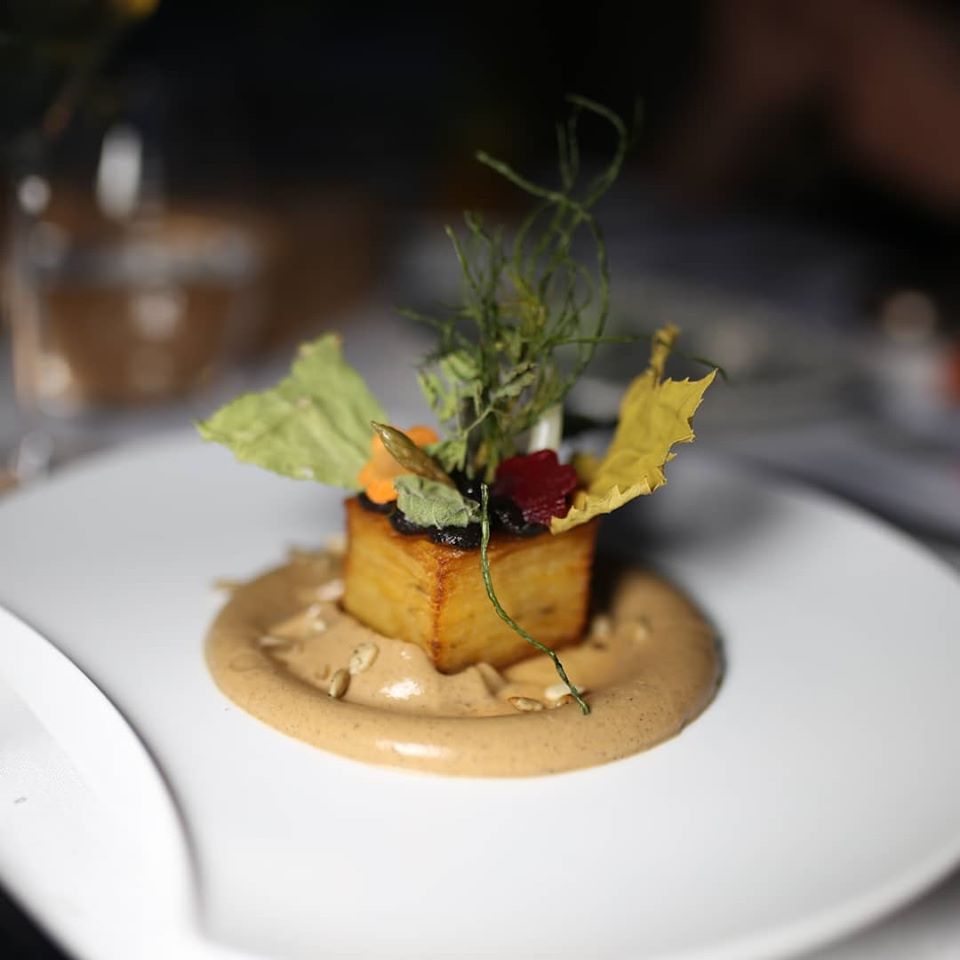
Spectacular presentation, one of the many wow factors attracting curious visitors to Boškinac on Pag © Boškinac on Pag
Of course, it's too early to tell if Boškinac will maintain its story of success through summer 2020. Šuljić is aware of this. And, even though it is even more difficult to predict the rest of the season than in any other year, he remains decidedly unworried because of their experiences so far.
“It is really interesting,” he says, when asked about future bookings for this summer, “I've never known anything like it. We have so far not had any bookings further than three or four weeks in advance. It's much more week to week. For instance, right now we have zero bookings for August. Usually, I would be concerned. But, it was the same one month ago and now we are almost full. All of the bookings are last minute. People are making their decisions based on the status and the quality of the information available. They check the news and the websites for advice, make a decision and then off they go.”
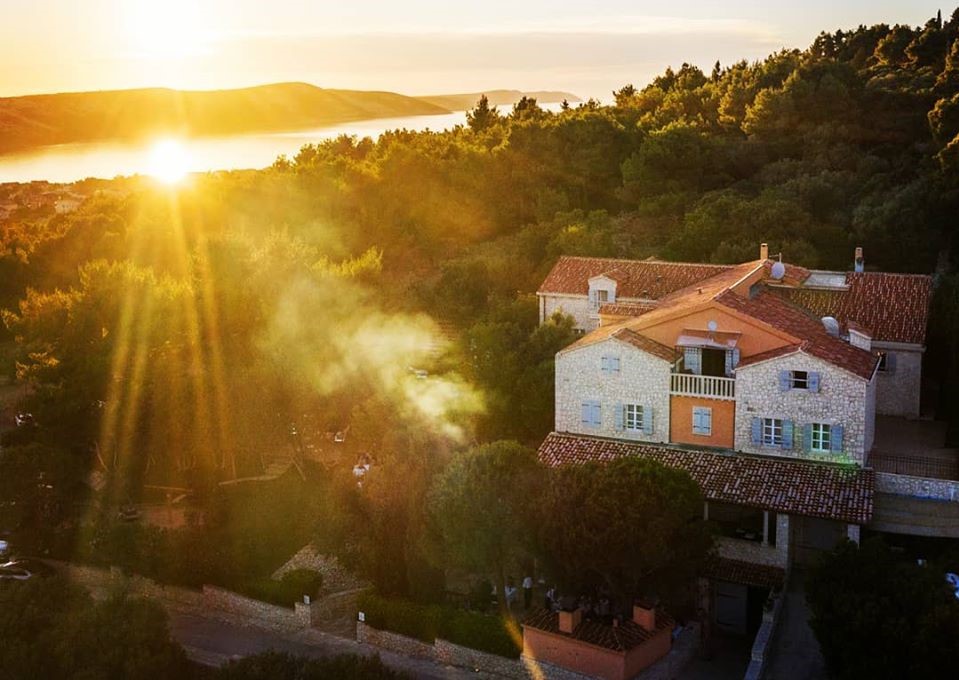
© Boškinac on Pag
For the best and most up-to-date information on Coronavirus and travel to Croatia, bookmark the Total Croatia News news page.
Total Croatia News is the best-read English language news site covering Croatia for people across south-east Europe. If you want to get your message across to those booking last-minute visits to the Croatia in summer 2020, contact us at This email address is being protected from spambots. You need JavaScript enabled to view it. to see what we can do for you.


